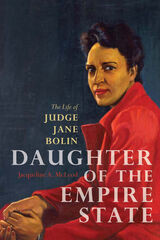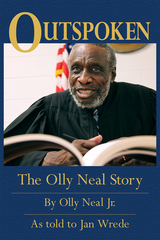
Bolin was appointed to New York City's domestic relations court in 1939 for the first of four ten-year terms. When she retired in 1978, her career had extended well beyond the courtroom. Drawing on archival materials as well as a meeting with Bolin in 2002, historian Jacqueline A. McLeod reveals how Bolin parlayed her judicial position to impact significant reforms of the legal and social service system in New York.
Beginning with Bolin's childhood and educational experiences at Wellesley and Yale, Daughter of the Empire State chronicles Bolin's relatively quick rise through the ranks of a profession that routinely excluded both women and African Americans. Deftly situating Bolin's experiences within the history of black women lawyers and the historical context of high-achieving black New Englanders, McLeod offers a multi-layered analysis of black women's professionalization in a segregated America.
Linking Bolin's activist leanings and integrationist zeal to her involvement in the NAACP, McLeod analyzes Bolin's involvement at the local level as well as her tenure on the organization's national board of directors. An outspoken critic of the discriminatory practices of New York City's probation department and juvenile placement facilities, Bolin also co-founded, with Eleanor Roosevelt, the Wiltwyck School for boys in upstate New York and campaigned to transform the Domestic Relations Court with her judicial colleagues. McLeod's careful and highly readable account of these accomplishments inscribes Bolin onto the roster of important social reformers and early civil rights trailblazers.

His road to success was not a smooth one, and Neal tells his unique story with humor, candor, and hard-earned wisdom, explaining his rocky journey from hardscrabble beginnings in rural Lee County to the role of prosecutor to the judicial bench. Along the way, many whites saw him as a threat to the established order and many blacks saw him as a traitor who was prosecuting and sitting in judgment of his own people. But Neal emphasized fairness and equal treatment at every opportunity, saying, “The way I got past all of this was by talking to my people about what I did and why, and by telling them how difficult it was for me. And I think that many folks understood me.” Looking back on these years and the people he met along the way, he offers insights into the traumas of the time and the toll they took on his mental and physical health, as well as the relationships that helped him face these challenges.
READERS
Browse our collection.
PUBLISHERS
See BiblioVault's publisher services.
STUDENT SERVICES
Files for college accessibility offices.
UChicago Accessibility Resources
home | accessibility | search | about | contact us
BiblioVault ® 2001 - 2024
The University of Chicago Press









